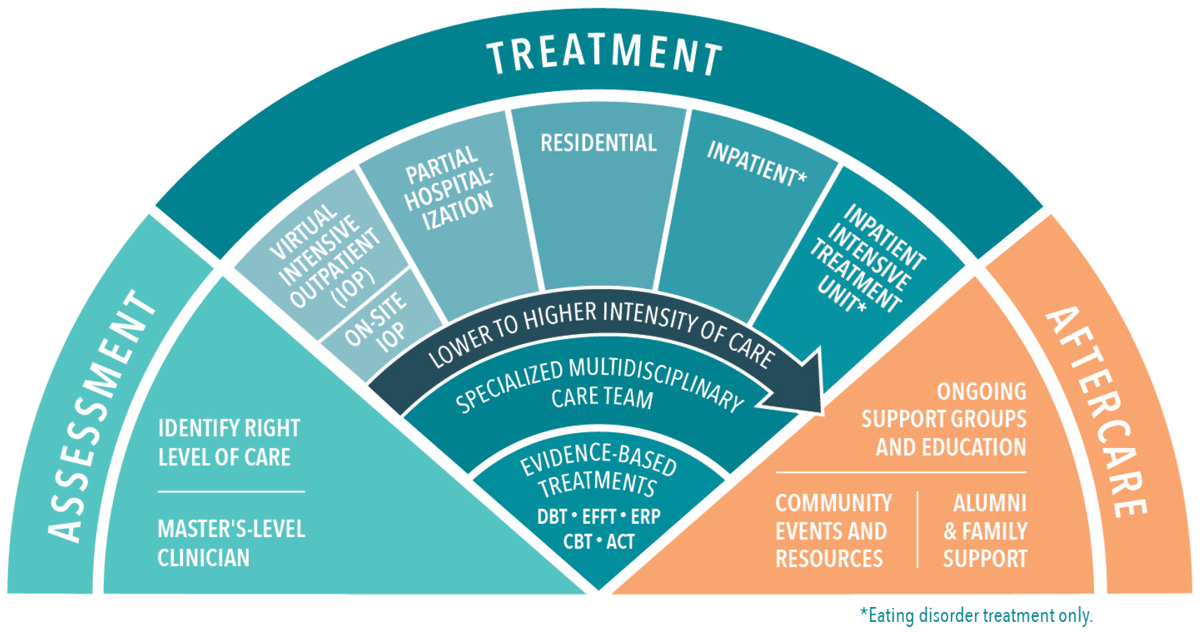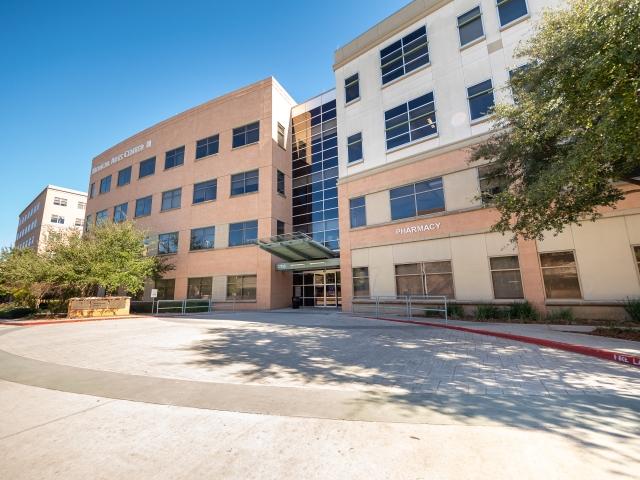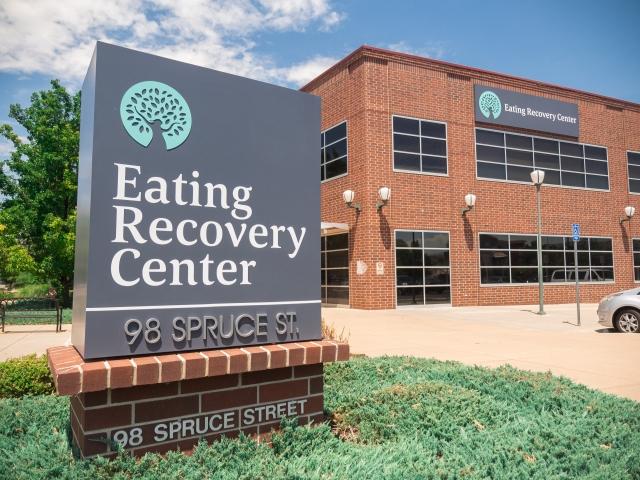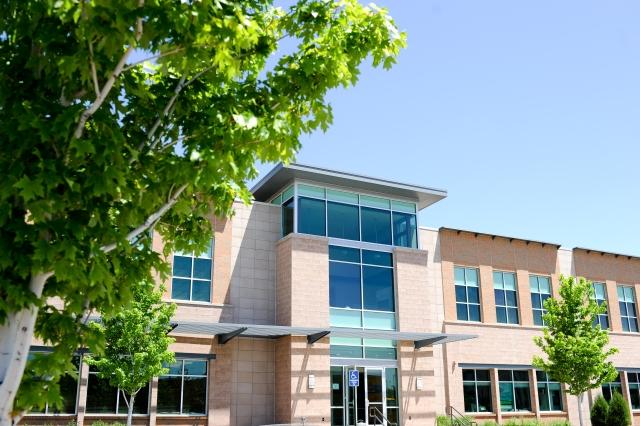Explore our evidence-based seven-day PHP
Eating disorders don’t take the weekends off, and neither do we. Since unstructured weekends can create unnecessary setbacks and increase the risk of relapse, we offer a partial hospitalization program (PHP) for eating disorders seven days a week.
Here's what sets our eating disorder PHP apart from the others:
- ERC is the only eating disorder PHP with a full-time primary care physician and psychiatrist on staff.
- We have the unique capacity to run medical tests on-site, manage complex medical situations, and address co-occurring and preexisting medical issues in a timely fashion.
- You can find your way to recovery with mealtime support, evidence-based therapies, medical supervision, strong family programming and more.
Show up as you are and find the healing you deserve.

Real People. Real Stories. Real Progress.
Our expert care teams ensure people of all ages, races and gender identities get the exact support they need at each stage of their recovery. With the right care, lasting healing is possible – and we have the data to show it.
73% of patients no longer reported significant eating disorder symptoms
ERC's eating disorder PHP includes:
- Programming seven days per week, six to 11 hours per day*
- Full-time primary care physician and psychiatrist on staff
- Supervision by experienced registered dietitians and mental health therapists specializing in eating disorders
- Eating disorder recovery skill building with individual therapy, interactive group sessions, passes and outings
- Daily, individualized meal planning, nutritional support and education
- Evidence-based eating disorder therapies, including acceptance and commitment therapy (ACT), dialectical behavior therapy (DBT), cognitive behavioral therapy (CBT), emotion-focused family therapy (EFFT) and more
- Weight-inclusive, trauma-informed and gender-affirming care and LGBTQIA+ and BIPOC support
- Family programming, family meals, multifamily group therapy and support groups for caregivers
- Access to local hospitals for urgent matters that can’t be handled on site
*Hours vary by location.
Find Recovery with Evidence-Based Therapies

PHP for children and teens
When a child is struggling with an eating disorder or mental health concerns, it can cause a lot of stress and worry in the family. This is why our compassionate care team provides ongoing support to families and caregivers in our child-friendly centers.
Before, during and after care, patients and families benefit from free ongoing education, resources and support groups. With one conversation, we’ll help you better understand what your loved one is going through and how to support them.

Education support for children & teens
Wondering how your child will maintain schoolwork in a seven-day treatment program?
Our educational specialists work with school-aged patients for up to three hours per day, Monday through Friday, in a classroom setting devoted to completing school assignments.
Our licensed educational specialists are here to:
- Coordinate coursework and assignments
- Communicate with your child’s school, provide assessments and help you with securing 504 accommodations, if needed
- Offer tutoring and ongoing educational support during treatment and the transition back to school
Learn more about our approach to education in eating disorder treatment by visiting the link below.
*Educational support offered through high school.

Adult PHP eating disorder treatment
At ERC, you’ll find consistent, proven treatment that works. Our personalized approach to care starts with our first interaction. We’ll get to know you as a whole person, your personal strengths and challenges, where you are in your journey and how we can help you move forward. We welcome adults of all ages, genders, cultures, ethnic backgrounds, body shapes and sizes. Rest assured: This can be the start of your being heard, understood and healed.

Programs for caregivers and families
Family and caregiver involvement is critical to supporting a loved one in eating disorder recovery. In treatment, we work closely with caregivers to teach you everything you will need to know to support your loved one’s recovery.
Take part in:
- Ongoing free virtual caregiver support groups
- Virtual Family & Friends Education Series
- Hope Orientation
- Eating Disorders 101
- Weekly family therapy sessions
- Weekly nutrition education sessions with registered dietitians to discuss meal planning and your loved one’s progress

Aftercare support
We offer personal, ongoing support after discharge to help you move deeper into your recovery journey by:
- Collaborating with outpatient providers
- Providing you with free virtual support groups and educational opportunities
- Sending you personalized recovery resources via email
At ERC, our community outreach liaisons are dedicated to supporting you and your family throughout the entire treatment process. After you discharge from treatment, they will provide you with the resources and support options you’ll need, including:
Why Choose ERC?
Think of ERC’s continuum of care as a “golden thread” providing you with smooth transitions and consistency throughout treatment. ERC’s continuum of care team has been intentionally and carefully trained to:
- Get to know who you are as a whole person
- Provide consistent support that moves with you
- Reduce the risk of relapse during treatment
- Eliminate your stress in having to tell your story again and again
- Ensure access to medical and psychiatric experts in the eating disorders field
- Offer education and support to families and caregivers
- Increase the likelihood of insurance approving or extending your care
- Make sure that you have access to ongoing education, events and support groups after discharge
- Create seamless transitions with each level of care change
- Ensure uninterrupted connections with school (for child and adolescent patients)

Our continuum of care model ensures that you will be connected with the right support at the right time, from the initial assessment all the way through to aftercare.

7 key benefits of ERC's PHP
- We offer the maximum clinical standard of care (six to 11 hours of programming per day, seven days per week) to reduce the risk of relapse.
- Easy access to psychiatrists and primary care physicians means consistent, ongoing medication management and medical support.
- Supervision by trained clinicians during meals and snacks provides you or your loved one with empathy and support.
- Creative, nutritionally sound menus with diverse options can accommodate vegetarian, kosher and halal diets
- Evidence-based therapy approaches, including family-based treatment (FBT) and emotion-focused family therapy (EFFT), provide support and education for the entire family.
- Family meals on and off the unit include restaurant outings and access to teaching kitchens to practice meal planning.
- Comprehensive educational support for school-age individuals takes place up to three hours per day, Monday through Friday, with a personal laptop provided to help complete assignments.
Get matched with the exact support you need.
With one conversation, our mental health professionals will help you better understand what you’re going through and what you need.
We will meet you where you are, listen to your story in a therapeutic setting, and match you with the level of support that meets your struggle.
Conditions We Treat
-

Eating Disorders
An eating disorder is a treatable mental illness that includes a number of different symptoms, including extreme emotions, attitudes, and behaviors surrounding weight and food issues.
-

Anorexia
Anorexia nervosa is characterized by an obsessive fear of weight gain and a refusal to maintain a healthy body weight.
-

Atypical Anorexia
You can’t tell if someone has an eating disorder just by looking at them. See how atypical anorexia affects people in a variety of body shapes and sizes.
-

ARFID
ARFID is a lesser known eating disorder that frequently begins as early as infancy or childhood, but adults can also suffer.
-

Binge Eating Disorder
Binge eating disorder is characterized by frequent overeating – at least once a week for three months – combined with a lack of control, intense feelings of distress and several other characteristic behaviors.
-

Bulimia
Bulimia is characterized by patterns of bingeing and purging.
-

Compulsive Overeating
Compulsive overeating can involve binge eating and weight gain, but it can also involve other behaviors.
-

Diabulimia
The term diabulimia is used to describe the diagnosis of an eating disorder in an individual with type 1 diabetes. These patients intentionally misuse insulin for weight control.
-

OSFED
Some eating disorders do not meet all of the diagnostic criteria for specific diagnoses like anorexia nervosa and bulimia nervosa.
-

Orthorexia
Some people go to extremes to “eat clean” at all times. This may lead to a disordered eating pattern known as orthorexia.
View all levels of care
-

Inpatient
Our Inpatient programming is designed to support adults, children and adolescents of all genders who are acutely ill and are experiencing medical and mood instability as a result of their eating disorder.
-

Residential
Within ERC Pathlight's step-down model of care, the Residential eating disorder treatment program as well as the Residential mood & anxiety treatment program offer medically stable patients a highly-structured and supportive 24-hour treatment environment.
-

Partial Hospitalization
Our Partial Hospitalization Program (PHP) offers some of the same intensity and structure of Residential mood, anxiety, and eating disorder treatment while providing additional opportunities to practice recovery outside of the controlled eating disorder treatment environment during evenings at home or in peer-supported apartment communities.
-

On-Site Intensive Outpatient Treatment
Our Intensive Outpatient program is a flexible mood, anxiety, and eating disorder treatment program that allows patients to work, go to school, or care for children during the day and sleep at home at night.
-

Virtual Intensive Outpatient - Eating Recovery At Home
ERC is removing the barriers that can keep patients with anorexia, bulimia, and other eating disorders from receiving treatment. Through telebehavioral health programming, Eating Recovery At Home (our virtual Intensive Outpatient Program) offers the same proven care as our in-person treatment centers.
Hide Last Child Layout Div



















